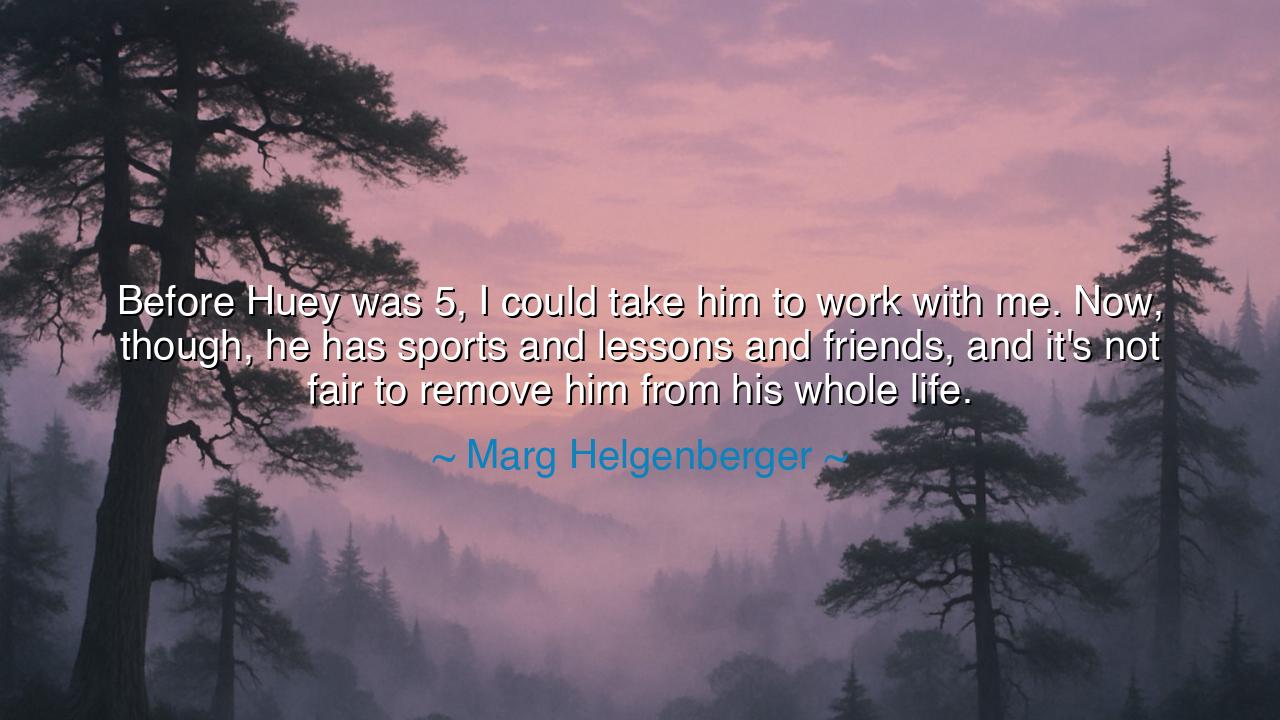
Before Huey was 5, I could take him to work with me. Now
Before Huey was 5, I could take him to work with me. Now, though, he has sports and lessons and friends, and it's not fair to remove him from his whole life.






When Marg Helgenberger said, “Before Huey was 5, I could take him to work with me. Now, though, he has sports and lessons and friends, and it's not fair to remove him from his whole life,” she spoke with the heart of a mother torn between her vocation and her devotion. These words are not simply about parenting—they are about the sacred responsibility to honor the life and growth of a child, even when one’s own desires might pull in another direction. They remind us that children are not extensions of their parents’ world, but souls who must build their own.
The origin of this quote lies in Helgenberger’s dual life as both an acclaimed actress and a mother. In her early years of motherhood, she could bring her son Huey with her to the set, folding him into her work and world. But as he grew, he began to form his own universe—of sports, studies, friendships, and commitments. She realized that to uproot him constantly for her own career would be to deny him the soil in which his independence, discipline, and joy could take root. Her words carry the wisdom of one who recognizes that love sometimes means letting go.
History has often shown us this delicate balance between duty to the world and duty to the family. Consider the story of Marcus Aurelius, the philosopher-king of Rome. While he bore the immense burden of empire, he still recorded in his Meditations reminders to care for his children and honor their needs. Like Helgenberger, he knew the tension between the public stage and the private hearth, between leading others and nurturing those closest to him.
Her reflection also reveals a profound respect for the autonomy of a child. Too often, children of fame are carried into the glare of their parents’ careers, losing the chance to grow among peers, to experience the ordinariness of play, practice, and friendship. By saying “it’s not fair to remove him from his whole life,” Helgenberger recognized that true love is not possession but protection. It is ensuring that her son has the freedom to live fully in his own world, not endlessly orbit hers.
There is also humility in her confession. For a parent to say, “I cannot always bring my child with me,” is to admit limits, to acknowledge that love must sometimes restrain itself. This is the courage of self-denial, the strength to step back so another may step forward. Just as the gardener must stop pruning so the tree may grow wild and tall, so must the parent sometimes withdraw to let the child root himself in his own soil.
The lesson for us is clear: honor the lives of those you love, even when it means setting aside your own desires. Whether in family, friendship, or community, do not cling so tightly that you choke the growth of others. Instead, be the foundation, the quiet support, the steady presence that allows them to thrive in their own chosen paths. True love is not the drawing of another into your world, but the blessing of their right to create their own.
So let us remember Marg Helgenberger’s words: “It’s not fair to remove him from his whole life.” Let them remind us that love requires fairness, that the young must be allowed to weave their own stories, and that sometimes the greatest act of devotion is to step aside. For in doing so, we give the next generation not our shadow, but the gift of light.






AAdministratorAdministrator
Welcome, honored guests. Please leave a comment, we will respond soon